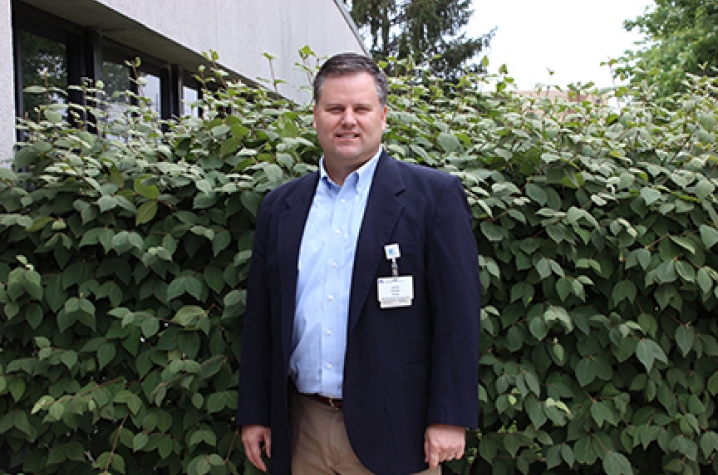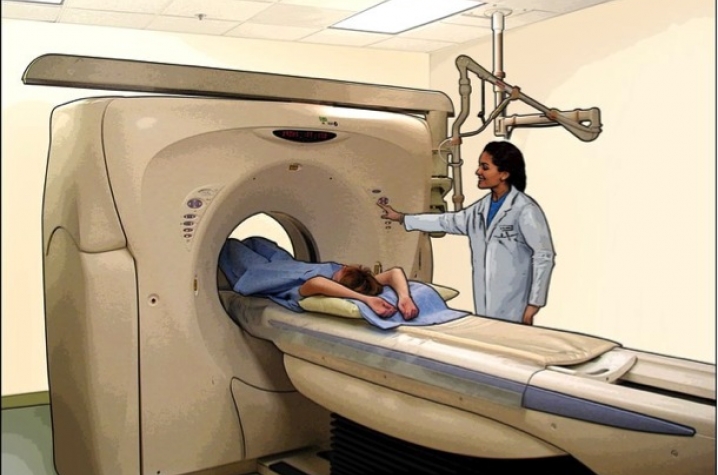UK Psychologist Creating Online Tool to Help Patients Navigate Lung Cancer Screening Decision
LEXINGTON, Ky. (July 30, 2014) — The phrase "we caught it early" is possibly the best news a patient can hear in the midst of a cancer diagnosis. Combating cancer in its earliest stages, when the disease is localized to a certain part of the body, gives patients the best chances of survival.
Screenings for breast, skin, colon, prostate and other forms of cancer are touted for saving lives through early detection. Many health care providers recommend cancer screenings as a precautionary measure, especially for high-risk patients. But in the case of lung cancer, the leading cause of cancer death in the United States, the patient's decision to undergo a screening process is more complex.
According to University of Kentucky psychologist Dr. Jamie Studts, lung cancer screening is an algorithm, not an event. Patients aren't always aware of the physical and psychological consequences of the lung cancer screening process, which can lead to false positive results, invasive biopsy procedures, harmful radiation exposure and anxiety caused by an ongoing process.
Studts, a researcher in the UK Department of Behavioral Science and the Cancer Prevention and Control Program of the Markey Cancer Center, is working to develop an online tool that will help individuals at high risk for lung cancer navigate the lung cancer screening decision-making process. He said the decision to undergo lung cancer screening should be well-informed and aligned with the patient's personal values. Studts is collaborating with Dr. Margaret Byrne, a health economist and medical decision-making researcher at the University of Miami, on this project, which is funded by a grant awarded from the National Cancer Institute.
"Screening is for asymptomatic, healthy people to find out there's something wrong," Studts said. "You are committing to a series of events that will lead to either learning you don’t have cancer, or detecting and treating it."
A number of factors, including the Affordable Care Act's provision of accessibility to cancer screening services and results from a 2011 National Lung Screening Trial conducted by the National Cancer Institute, have reinvigorated the public's interest in lung cancer screening. The National Lung Screening Trial reported a 20 percent relative reduction in mortality for high-risk individuals who received a low-dose computed tomography (CT) scans. But the report also identified substantial risks and limitations to lung cancer screenings, which included overdiagnosis and relatively high false positive rates. The rate of false positive occurrence in the study of a high-risk population was 39 percent. With high rates of false positive scans and ongoing follow-up treatment, Studts said widespread lung cancer screening could be a costly burden for government-funded health care but could also prevent very expensive treatments for late stage lung cancer.
Studts and his fellow researchers have proposed a decision-making aid that is designed to accomplish three objectives: disperse knowledge, empower the patient and clarify individual's values. The aid will present accurate information about the screening process and calculate feedback that's tailored to the individual. The tool will also empower the individual to discuss the decision with their health care provider by providing a prompt list of potential questions. Finally, the values clarification component of the tool will explore the patient's personal preferences regarding the lung cancer screening process. For instance, if a patient is ultimately unwilling to undergo surgery for a lung biopsy, the tool can determine that they will likely experience minimal benefit from a screening.
"The goal is to help people interpret what they learn in the context of what’s important to them regarding their goals in health," Studts said. "They will learn about lung cancer screening options, benefits, harms and uncertainties associated with the modality.”
To develop the provider education program, Studts has collaborated with a team of University of Kentucky experts, including Dr. Eric Bendsadoun, a pulmonologist and director of the lung cancer screening program; Dr. Susanne Arnold, a medical oncologist who is part of the multidisciplinary lung cancer screening program; Dr. Michael Brooks, a cardiothoracic radiologist; Dr. Mark Dignan, a cancer prevention and control researcher; Dr. Eric Durbin, a cancer research informatics expert; and Dr. Brent Shelton, a cancer biostatistician.
The next step in their research will be conducting a clinical trial to test the decision-making aid among high-risk individuals, or high pack-year smokers, in Florida and Kentucky. Recently, Studts, along with Dr. Tim Mullet, a cardiothoracic surgeon at UK, received funding from the Kentucky Lung Cancer Research Program to develop an online continuing education program geared toward educating health care providers about lung cancer screening and how to discuss the lung cancer screening question with their patients. Eventually, he envisions dispersing a comprehensive educational toolkit on lung cancer screening to clinics and hospitals.
Studts said the current research suggests that lung cancer screening has minimal benefits for individuals younger than 55. Still, many Americans with a history of high pack-year smoking will face the decision of whether to be screened for cancer in their lifetime. Studts believes it will be helpful to implement an online tool that will help guide members of the high-risk population through a decision-making process.
"We’re interested in delivering high quality patient centered care – helping people be engaged in their health care choices and helping health care providers engage in these choices too."
MEDIA CONTACT: Elizabeth Adams, elizabethadams@uky.edu






